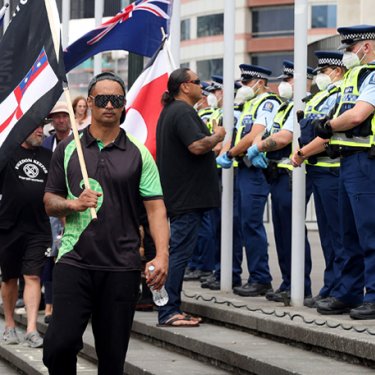Threats and violence against reporters from New Zealand’s “freedom convoy” protests

Reporters Without Borders (RSF) calls on the authorities in New Zealand’s capital, Wellington, to prosecute those responsible for the threats and violence against reporters coming from the large crowd of demonstrators camped outside the parliament building in the city centre for the past two weeks in a protest against obligatory Covid-19 vaccination.
The media are among the favourite targets of the 500 or so protesters still stationed in front of the parliament building, known as the Beehive, after arriving from various parts of the country in “freedom convoys” akin to those causing chaos in parts of Canada for the past month. The violence against journalists trying to cover the protest has included being regularly pelted with tennis balls with such not-very-subtle insults as "terrorists" and “paedophiles” written on them.
“Media = Fake News” and “Media is the virus” are typical of the slogans on the countless signs outside protesters’ improvised tents. Journalists who approach are also greeted with drawings of gallows and nooses, as well as insults and threats of violence – to the point that most of them now have bodyguards, says Mark Stevens, the head of news at Stuff, New Zealand’s leading news website.
“Your days are numbered”
Stevens sounded the alarm about the attacks on journalists in an editorial published on 11 February. “They’ve had gear smashed, been punched and belted with umbrellas,” he wrote. “Many reporters have been harassed [...], including one threatened with their home being burned down.”
The violence has not been limited to Wellington. In New Plymouth, a port 350 km north of the capital, an angry crowd tried to storm the offices of the local newspaper, Stuff's Taranaki Daily News, two weeks ago. Some of the protesters even managed to breach the newspaper’s secured doors and attack members of the staff. After the police intervened, local politician Brett Power urged the protesters to return in order to hold the editor “accountable for crimes” – meaning the newspaper’s failure to report their protests in the way they wanted.
The verbal and physical violence against journalists is accompanied by extremely shocking online hate messages. Stuff’s chief political reporter Henry Cooke tweeted an example of the threats he had received on social media: “You’re marked for death, you filthy sell-out, you evil, deceptive system pig propagandist. Many will beat you bloody and senseless and then shit on your face. [Your] days are numbered.”
“The virulence of the threats against journalists by demonstrators, and the constant violence to which they have been subjected since the start of these protests are not acceptable in a democracy,” said Daniel Bastard, the head of RSF’s Asia-Pacific desk. “We call on the office of the Prime Minister, Jacinda Ardern, to not allow these disgraceful acts to go unpunished. There is a danger that journalists will no longer be able to calmly cover these protests, opening the way to a flood of misinformation.”
In a recent article, Kristin Hall, a reporter for Television New Zealand’s 1News, described her dismay at discovering the level of “distaste for the press” among protesters who regard the mainstream media as nothing more than “a bunch of liars.” The blind rage is such that, “people have asked me why I’m not covering the protests while I’m in the middle of interviewing them,” she wrote.
“Headlocks, punches”
Protester mistrust is no longer limited to mainstream media regarded as accomplices of a system imposing pandemic-related restrictions, as Graham Bloxham – a Wellington resident who runs the Wellington Live Community local news page on Facebook – found to his cost when he went to interview one of the protest organisers, Sue Grey, on 18 February.
“We just wanted to show people that it is peaceful … then bang. They just yelled and whacked. They were just all on me and they basically beat me and my cameraman to a pulp,” he told 1News. “Headlocks, punches… they were really violent.”
A photo of a dozen Nazi war criminals being hanged at the end of the Second World War has been circulating on social media popular with the protesters for the past few days, accompanied by the comment: “Photograph of hangings at Nuremberg, Germany. Members of the media, who lied and misled the German people, were executed.” Definitely not subtle.
Attacks against journalists have rarely or never been as virulent as this in New Zealand, which is ranked 8th out of 180 countries in RSF's 2021 World Press Freedom Index.



